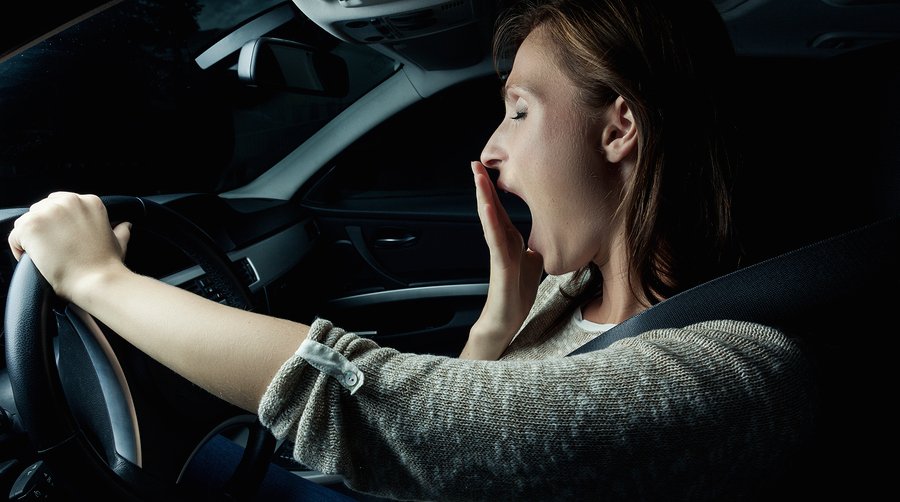Most of us know way better than to drink and drive. If we’re getting behind the wheel, we know our limits and either skip the alcohol entirely or go very lightly on it to avoid taking any chances. But would it ever occur to you to pass on driving after getting little sleep? Not likely, but it should. New research suggests that when we’re not sleeping enough, the chances of causing a car accident can be as high as those of driving while intoxicated.
A new report from the AAA Foundation for Traffic Safety has found that our risk of being involved in a car crash is almost double when we miss as little as one hour of sleep at night.1 Tefft, Brian C. “Acute Sleep Deprivation and Risk of Motor Vehicle Crash Involvement.” AAA. December 2016. Accessed 11 December 2016. http://publicaffairsresources.aaa.biz/wp-content/uploads/2016/11/Acute-Sleep-Deprivation-and-Risk-of-Motor-Vehicle-Crash-Involvement.pdf. The researchers arrived at their findings after conducting an analysis of the results of a large National Highway Traffic Safety Administration (NHTSA) survey. This included data from 4,571 car accidents to which the police were called, and they all took place between July, 2005 and December, 2007. Each crash was serious enough that at least one of the vehicles involved required towing from the scene and emergency medical personnel were dispatched to assess the occupants of the cars.
The investigators, who were present in the aftermath of each of the accidents, were trained to determine what factors influenced the crash. They also spoke to all of the drivers involved to ask questions about their typical sleep habits and any changes in sleep that had occurred in the 24 hours preceding the crash. The researchers found that the subjects whose actions behind the wheel contributed to the crash were more likely to have slept less than usual in the day prior to the accident and tended to have made a change in their sleep schedule at some point in the previous week.
In fact, the risk of an accident rose steadily as drivers reported getting fewer hours of sleep. Compared with drivers who received a minimum of seven hours of sleep the previous night, those who said they slept for between five and six hours had nearly twice the chance of contributing to a car accident. And the drivers who reported sleeping for four to five hours the night before had 4.3 times the risk of contributing to a crash versus their peers who had gotten at least seven hours of slumber.
For those who received just four hours or fewer of sleep, the odds were considerably worse, reaching an astounding 11.5 times the chance of having an accident. This figure is actually comparable to driving with a blood alcohol level of between 0.12 and 0.15—well above the legal limit of 0.08 for driving while intoxicated in most of the United States.
Other factors may come into play as well in many crashes. The researchers broke the information down by the participants’ age and discovered that both the youngest and oldest of drivers tended to be the most frequent contributors to accidents in which lack of sleep was an issue. The age group least likely to be involved in a lack-of-sleep-related accident was middle-aged adults. We do not know, however, whether this is because younger drivers are less experienced and the oldest drivers have slowed reaction time, or if these age groups are simply more likely to get less sleep.
At any rate, this investigation is an important wake-up call (pun very much intended) to remind us that we need to be alert and focused every time we get behind the wheel. A 2016 study at the Centers for Disease Control and Prevention in Atlanta, Georgia showed that deaths due to car accidents are one of the top three reasons why Americans have a lower life expectancy rate than similar developed nations.2 Fenelon, Andrew; et al. “Major Causes of Injury Death and the Life Expectancy Gap Between the United States and Other High-Income Countries.” JAMA. 9 February 2016. Accessed 12 December 2016. http://jamanetwork.com/journals/jama/fullarticle/2488300.
While you might not ever consider driving through the night or at a very late hour when you know you’ll be exhausted, it somehow doesn’t always occur to us that driving during the day when you’ve barely slept the night before—even if it’s going on a routine drive in an area you’re very familiar with—can be dangerous too. So if you were out too late, or something kept you up last night, don’t hesitate to ask someone for a ride or choose public transportation instead. Or at the very least, force yourself to be extra alert—if possible. It’s never worth the risk of harm to yourself or anyone else.
References
| ↑1 | Tefft, Brian C. “Acute Sleep Deprivation and Risk of Motor Vehicle Crash Involvement.” AAA. December 2016. Accessed 11 December 2016. http://publicaffairsresources.aaa.biz/wp-content/uploads/2016/11/Acute-Sleep-Deprivation-and-Risk-of-Motor-Vehicle-Crash-Involvement.pdf. |
|---|---|
| ↑2 | Fenelon, Andrew; et al. “Major Causes of Injury Death and the Life Expectancy Gap Between the United States and Other High-Income Countries.” JAMA. 9 February 2016. Accessed 12 December 2016. http://jamanetwork.com/journals/jama/fullarticle/2488300. |












Re sleep, deprivation, how
Re sleep, deprivation, how about the truly damaging hours without sleep that are inflicted on Medical Residents? I haven’t heard any acknowledgement about this estremely serious situation. Residents are often doing up to 36 hour shifts with only fleeting snatches of “sleep” in small adjacent rooms. My medical resident daughter is experiencing this on a regular basis and tells me about her colleagues falling asleep at the wheel on freeways.
We agree, we have written
We agree, we have written about this issue extensively in several articles. Here’s one: https://jonbarron.org/article/sleep-deprivation-shuts-down-your-brain
So, what do you do about the
So, what do you do about the type of insomnia that wakes you up at 4am?
Do a search on “sleep” on
Do a search on “sleep” on this website, we have tons of tips!